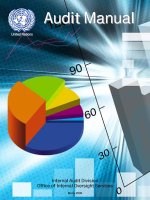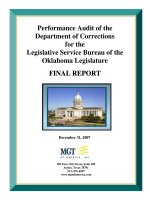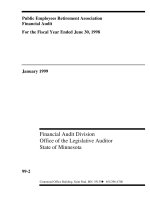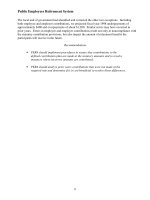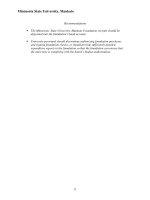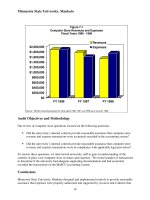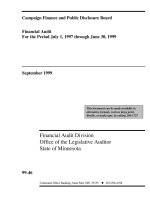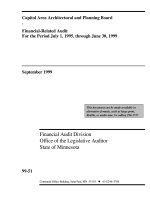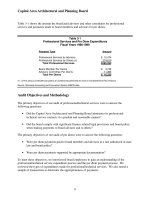Hennepin Technical College Financial Audit For the Period July 1, 1995, through June 30, 1998 July 1999 Financial Audit Division Office of the Legislative Auditor State of Minnesota_part2 pot
Bạn đang xem bản rút gọn của tài liệu. Xem và tải ngay bản đầy đủ của tài liệu tại đây (38.5 KB, 10 trang )
Hennepin Technical College
7
Chapter 3. Tuition and Fees
Chapter Conclusions
Generally, Hennepin Technical College designed and implemented internal
controls to provide reasonable assurance that the appropriate tuition and fees
were collected, adequately safeguarded, and accurately reported in the
accounting records. However, the college needs to improve its monitoring of
and accounting for third-party accounts receivable. The college also did not
adequately segregate duties over tuition revenues at its Eden Prairie campus or
certain customized training receipts at its Hopkins location. In addition,
customized training receipts are at risk during transfer through intercampus
mail. For the items tested, the college complied with applicable finance-related
legal provisions and management’s authorization.
Hennepin Technical College collected tuition and fees each quarter from students enrolled in
campus programs, continuing education, and customized training classes. The college used the
Collegiate Information System (CIS) to register, bill, and collect tuition. For fiscal year 1998, the
resident tuition rate was $42.65 per credit. The college recorded $19.7 million of tuition and fee
revenue for the three years ended June 30, 1998.
Hennepin Technical College delivers industry-specific training and educational services through its
customized training classes. Customized training is designed to address the local and regional
education and training needs of business and industry. Businesses can request classes to meet
their specific needs. Individuals can also register for a variety of different course offerings.
Customized training classes accounted for $4.1 million of the tuition revenues during the audit
period.
Figure 3-1 shows tuition and fee revenue by source.
Hennepin Technical College
8
Audit Objectives and Methodology
Our review of Hennepin Technical College’s tuition and fees focused on the following question:
• Did the college design and implement internal controls to provide reasonable assurance
that the appropriate tuition and fees were collected, adequately safeguarded, and
accurately reported in the accounting records?
• Did the college comply with applicable legal provisions and management’s authorization?
To meet these objectives, we interviewed college employees to gain an understanding of the
internal controls over billing, collecting, and recording of tuition and fee revenue. We determined
the reasonableness of tuition revenue recorded on the MnSCU accounting system in relation to
the recorded credits on CIS. We reviewed the tuition and fees collected for customized training
classes. We also tested revenue transactions to determine the timeliness of deposits and recording
of revenue on MnSCU accounting and the statewide accounting system (MAPS).
Conclusions
Hennepin Technical College generally designed and implemented internal controls to provide
reasonable assurance that the appropriate tuition and fees were collected, adequately safeguarded,
and accurately reported in the accounting records. However, as explained in Finding 2, the
Figure 3-1
Tuition and Fee Revenue by Source
$-
$1,000,000
$2,000,000
$3,000,000
$4,000,000
$5,000,000
$6,000,000
$7,000,000
1996 1997 1998
Student Tuition Customized Training
Source: MnSCU accounting system.
Hennepin Technical College
9
college needs to improve its monitoring and accounting for third-party accounts receivable. The
college also did not adequately segregate duties over tuition revenues at its Eden Prairie campus
or certain customized training receipts at its Hopkins center, as discussed in Finding 3. In
addition, customized training receipts are at risk during transfer through intercampus mail. For
the items tested, the college complied with applicable finance-related legal provisions and
management’s authorization.
2. Hennepin Technical College did not adequately monitor third-party accounts receivable
for student tuition and customized programs.
Hennepin Technical College did not adequately manage its third-party accounts receivable.
Third-party accounts are those in which another entity has agreed to pay a student’s tuition. The
college did not periodically balance the accounts receivable detail to cash received and billing
information. Without use of this control, the integrity of the third-party accounts receivable detail
is questionable. As a consequence, Hennepin Technical College could not accurately determine
the number and amount of outstanding accounts receivable at June 30, 1998. We estimated third-
party accounts receivable of approximately $38,263 and $19,280 for student and customized
training tuition, respectively, as of June 30, 1998. The exact amount of third-party accounts
receivable is uncertain because of the integrity issues identified above.
In addition, Hennepin Technical College did not adequately pursue collection of third-party
accounts receivable. It could improve procedures for pursuing older account balances. For
example, third-party customized training had about 10 accounts outstanding over 175 days as of
June 30, 1998. In addition, there were about 20 student tuition accounts outstanding over 400
days. The college did not use a collection agency or the state revenue recapture program to help
collect these outstanding third-party accounts receivable.
Recommendations
• Hennepin Technical College should reconcile payments collected to the
related accounts receivable records.
• Hennepin Technical College should monitor and actively pursue the
collection of outstanding receivables.
3. Hennepin Technical College did not have an adequate separation of duties over certain
tuition and customized training receipts.
The Eden Prairie campus business office and the Hopkins customized training business office did
not adequately separate duties over receipts. At the Eden Prairie campus business office, one staff
member routinely collected tuition and performed the daily reconciliation of tuition with the
related account receivable activity on MnSCU. In addition, this individual had the ability to create
negative receipts on MnSCU accounting. The duties of processing tuition receipts and
performing daily reconciliations of tuition collections should be segregated.
Hennepin Technical College
10
Customized training faculty members collected open enrollment customized training tuition at the
commencement of the initial class period. Open enrollment customized training classes are held at
the college campuses as well as many other locations throughout the metro area. Not all students
register prior to attending the open enrollment customized training classes. Consequently, these
students are not recorded on a class roster. Students attending a class, but not recorded on the
roster register, pay the faculty member at the beginning of the class. As a result of this process,
there is no independent verification of tuition collections.
The college should separate the responsibilities of recordkeeping and tuition collection. This
separation of duties increases the assurance that collected cash is properly recorded in MnSCU
accounting and deposited in the state treasury.
Recommendation
• The college should separate registration and tuition collection responsibilities
for customized training receipts, or consider an independent verification of
customized tuition collections.
4. Hennepin Technical College should improve processing procedures for certain
customized training receipts.
The Plymouth Center offers customized training seminars and directs customers to remit
registration information and payments to the Plymouth business office. The Plymouth business
office processes the registration information and then sends the receipts to the Brooklyn Park
campus using intercampus mail. The receipts are estimated to be about $2,000 per week. The
Brooklyn Park campus processes the receipts and deposits the funds. Transferring these receipts
from the Plymouth business office to the Brooklyn Park campus using intercampus mail may
create an unwarranted risk of loss or theft to the college.
Recommendation
• The college should have the Plymouth Center instruct its customers to remit
registration information and payments directly to the Brooklyn Park business
office.
Hennepin Technical College
11
Chapter 4. Employee Payroll
Chapter Conclusions
Hennepin Technical College designed and implemented internal controls to
provide reasonable assurance that it accurately reported employee payroll
expenditures in the accounting records. In addition, for the items tested, the
college complied with applicable legal provisions and bargaining unit
agreements.
Employee payroll represents the college’s largest expense. Hennepin Technical College expended
approximately $58.6 million in payroll related costs during the audit period. The college employs
about 850 staff consisting of 646 full-time and part time faculty, and 204 classified and
unclassified staff.
The college’s employees belong to various compensation plans that include:
• American Federation of State, County, and Municipal Employees (AFSCME)
• Minnesota Association of Professional Employees (MAPE)
• Middle Management Association (MMA)
• Excluded Administrators Plan
• Commissioner’s Plan
• United Technical College Educators Plan (UTCE)
MnSCU and UTCE reached a final contract agreement in May of 1997. Under this agreement,
Hennepin Technical College adjusted its faculty salaries previously covered under the school
district contract to the final wages negotiated with UTCE. The adjustments were retroactive to
July 1, 1995.
Hennepin Technical College maintains its human resource and payroll functions primarily at the
Brooklyn Park campus. The payroll section processes biweekly payroll transactions on the state’s
payroll system (SEMA4). The payroll system interfaces with the State College and Universities
Payroll and Personnel Systems (SCUPPS), a system that provides employment history, pay rates,
and bargaining contract details for all college employees. The human resources section enters all
personnel changes and new employee records onto SCUPPS.
Audit Objectives and Methodology
Our review of Hennepin Technical College’s payroll expenditures focused on the following
questions:
Hennepin Technical College
12
• Did the college design and implement internal controls to provide reasonable assurance
that it properly authorized and accurately recorded payroll expenditures in the accounting
records?
• Did the college comply with applicable legal provisions and bargaining unit agreements?
To answer these questions, we made inquiries of the college’s staff to gain an understanding of
the payroll and personnel process. We tested a sample of payroll transactions to ensure that there
was proper documentation for those transactions. We performed analytical procedures. We
reviewed compensation amounts paid to employees and ensured that they agreed with amounts
recorded on SCUPPS. We also reviewed large severance payouts to determine if the payments
appeared reasonable and were accurately calculated.
Conclusions
Hennepin Technical College designed and implemented internal controls to provide reasonable
assurance that it accurately reported employee payroll expenditures in the accounting records. In
addition, for the items tested, the college complied with applicable legal provisions and bargaining
unit agreements.
Hennepin Technical College
13
Chapter 5. Administrative Expenditures
Chapter Conclusions
We concluded that Hennepin Technical College designed and implemented
internal controls to provide reasonable assurance that administrative
expenditures were properly authorized and accurately recorded in the
accounting records, and that fixed assets were adequately safeguarded from
theft or loss. In addition, for the items tested, the college complied with
applicable legal provisions and management authorizations.
Hennepin Technical College’s administrative expenditures included payments for purchased
services, supplies, equipment, utilities, and building improvements. Administrative expenditures
totaled $24,822,768 for the three years ended June 30, 1998. Various departments within the
college initiate a purchase through an on-line requisition form using the MnSCU accounting
system. An employee of Independent School District 287 processes the requisitions. The school
district performs this part of the purchasing function under the terms of a joint powers agreement
with the college. This employee is responsible for ensuring that the purchase request has the
required documentation such as bids, and that the request follows the college’s purchasing
guidelines. When the items are received, the department that ordered the goods compares the
purchase order to the packing slip. If the documents match, the department signs the packing slip
and sends it to the business office. The accounts payable section at the Brooklyn Park campus
matches the invoice against the approved requisition form, purchase order, and the packing slip,
and makes the payment. Payments are processed on MnSCU accounting.
Audit Objectives and Methodology
Our review of Hennepin Technical College’s administrative expenditures focused on the following
questions:
• Did the college design and implement internal controls to provide reasonable assurance
that administrative expenditures were properly authorized and accurately recorded in the
accounting records, and that fixed assets were adequately safeguarded from theft or loss?
• Did the college comply with applicable legal provisions and management authorizations?
To address these questions, we interviewed Hennepin Technical College employees to gain an
understanding of the purchasing and payment process. We reviewed a sample of administrative
expenditures to determine if the college properly authorized, processed, and recorded the
expenditures in the MnSCU accounting system. We also reviewed a sample of expenditures to
determine if Hennepin Technical College complied with applicable legal provisions. Finally, we
reviewed the college’s process to record and control fixed assets.
Hennepin Technical College
14
Conclusions
Hennepin Technical College designed and implemented internal controls to provide reasonable
assurance that administrative expenditures were properly authorized and accurately recorded in
the accounting records, and that fixed assets were adequately safeguarded from theft or loss. In
addition, for the items tested, the college complied with applicable legal provisions and
management authorizations.
Hennepin Technical College
15
Chapter 6. Enterprise Fund Revenues and Expenses
Chapter Conclusions
Hennepin Technical College designed and implemented internal controls to
provide reasonable assurance that bookstore and food service revenues were
complete, promptly deposited, safeguarded, and accurately reported in the
accounting records. Also, bookstore and food service expenses were properly
authorized, supported, and accurately recorded in the accounting records.
Bookstore inventory was also adequately controlled. However, we found the
college did not prepare financial statements for its bookstore and food service
operations or adequately document and independently review its void and
refund transactions.
Hennepin Technical College operates bookstores and food service facilities at its Brooklyn Park
and Eden Prairie campuses. The bookstores sell books, supplies, and apparel. The food services
offer breakfast, lunch, and dinner foods. The food service is staffed by college employees, as well
as students enrolled in the college’s culinary arts program.
Each bookstore accounts for sales through a point-of-sale computer program. The system is
directly linked to the bookstore’s cash registers. The system allows the bookstore to track sales
and inventory levels.
Table 6-1 summarizes the bookstore’s financial activities for fiscal year 1998.
Table 6-1
Summary of Bookstore Revenues and Expenses
Fiscal Year 1998
Revenue:
Sale of books $ 989,163
Sale of supplies 92,183
Sale of apparel 3,529
Other revenue 3,434
Total Revenue $1,088,309
Expenses:
Purchase of books $ 806,148
Bookstore salaries 126,205
Purchase of supplies 131,626
Purchase of apparel 3,642
Other purchases and operating expenses 32,850
Total Expenses $1,100,471
Note: This financial information is incomplete and does not permit net income to be measured. Missing information includes cost of
goods sold, rent, utilities, and depreciation.
Source: MnSCU General Ledger Summary Balances Report as of February 23,1999.
Hennepin Technical College
16
Table 6-2 summarize the food services financial activities for fiscal year 1998.
Table 6-2
Summary of Food Service Revenues and Expenses
Fiscal Year 1998
Revenue:
Sale of food $653,200
Vending commissions 19,180
Other revenue 2,402
Total Revenue $674,782
Expenses:
Food service salaries $412,675
Purchase of food 264,595
Other purchases and operating expenses 26,225
Total Expenses $703,495
Note: This financial information is incomplete and does not permit net income to be measured. Missing information includes cost of
goods sold, rent, utilities, and depreciation.
Source: MnSCU General Ledger Summary Balances Report as of February 23,1999.
Audit Objectives and Methodology
Our review of Hennepin Technical College’s bookstore and food service operations focused on
the following questions:
• Did the college design and implement internal controls to provide reasonable assurance
that bookstore and food service revenues were complete, safeguarded, promptly
deposited, and accurately reported in the accounting records?
• Did Hennepin Technical College design and implement internal controls to provide
reasonable assurance that bookstore and food service expenditures were reasonable,
properly authorized, and accurately reported in the accounting records?
To address these questions, we interviewed college staff to gain an understanding of the
bookstore and food service operations and to determine how revenues and expenditures were
processed. We reviewed the controls over the revenue and expense processes and inventories.
We sampled bookstore and food service revenues generated by daily sales activity. We also
performed detailed tests of bookstore and food service expenditures.
Conclusions
Hennepin Technical College designed and implemented internal controls to provide reasonable
assurance that bookstore and food service revenues were complete, promptly deposited,
safeguarded, and accurately reported in the accounting records. Also, bookstore and food service
expenditures were reasonable, properly authorized and supported, and accurately recorded in the
accounting records. Bookstore inventory was also adequately controlled. However, as explained
in Finding 5, the college did not prepare financial statements for its bookstore or food service
operations. In addition, as noted in Finding 6, the college did not adequately document and
independently review its void and refund transactions.
